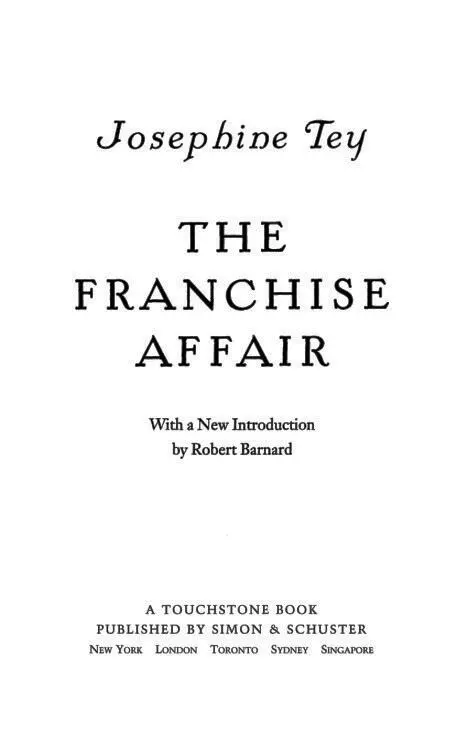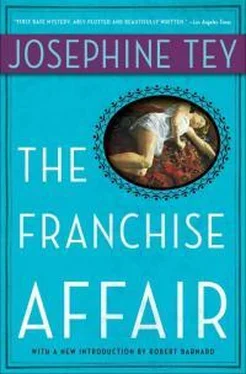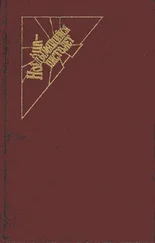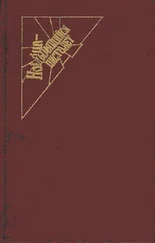Josephine Tey
THE FRANCHISE AFFAIR
1948

BY ROBERT BARNARD
M ystery readers who have never encountered Josephine Tey are in for a delicious treat. Tey belonged to the Golden Age of British crime writing (roughly speaking, 1920–1950), and her place in the pantheon of mystery writers is unassailable.
Josephine Tey (1896 or ’97–1952) is a writer who lives by her works alone. Nobody seems to know anything much about her life, in spite of her successful career in the theater, and nobody seems to care. The steady and sustained sale of her novels in the forty-odd years since her death is due to the books themselves, which have proved to have an enduring appeal. And I would hazard the guess that her readers’ attitude toward her is different from their attitude toward other classic crime writers: they regard her with love. They give to their favorite Tey novel what they once gave to their favorite books of childhood, to The Wind in the Willows, Little Women , or whatever: unconditional enthusiasm.
This strong bond between novelist and reader is based on trust – trust in someone who is not only a first-rate storyteller but one who is not content with a formula. Tey, in her best books, seeks to tell different sorts of story, in different ways. This marks her off from the usual purveyors of puzzle-plots, brilliant though they often are. Indeed, in her more straightforward detective stories Josephine Tey often reveals a sort of impatience with the rules and conventions of the whodunit. In A Shilling for Candles , for example, two of the three plot strands are unraveled with information that is either not given readers at the time the detective gets it or only revealed just before the unmasking of the criminal. She was, in other words, not interested enough in that kind of game, and preferred to play other, more varied sports.
Three of her novels occupy that hinterland – often uneasy, but not in her hands – between the crime novel and the “novel proper.” They all have crime at their heart, but they are as far as possible from the “body in the library” formula. Impersonation has been at the heart of many detective stories, but it has seldom carried the emotional charge of Brat Farrar , and our sympathies are never in a mere puzzle so skillfully and so surprisingly manipulated. The Daughter of Time is an almost unrepeatable success (a historical mystery reanimated and investigated by present-day inquirers), and it has aroused a whole new interest in what previously seemed a dusty and rather sordid period of English history – the reign of King Richard III and the murder of the Princes in the Tower. The Franchise Affair also has a basis in fact (an eighteenth-century case in which a maid charged her employers with abduction and mistreatment), but in her hands it becomes a sort of parable of the middle class at bay.
Coming at the tail end of the Golden Age of crime fiction, Tey does not escape some of the less attractive attitudes of her contemporaries: anti-Semitism, contempt for the working class, a deep uneasiness about any enthusiasm (for example, Scottish nationalism) that, to her, smacks of crankiness. If Agatha Christie’s “Anthony Astor” in Three Act Tragedy is indeed a hit at Tey, then Christie targets Tey’s weaknesses squarely when she talks about “her spiritual home – a boardinghouse in Bournemouth,” with the implication of dreary respectability and conventionality.
But that is to seize on the inessentials and to ignore the essence: Josephine Tey’s brilliant storytelling; her varied, loving characterization; above all, her control of reader sympathies. These are evident in all her novels, whether whodunits or more unconventional structures. If Ngaio Marsh or Christie had died as young as Tey, we would have a good idea of what they could have gone on writing. We can guess that Tey would have written several more whodunits, but what she would have written is beyond our guesswork. That in itself is her best tribute.
ROBERT BARNARD is the author of more than thirty crime novels, including, most recently, Bad Samaritan , and a collection of short stories, The Habit of Widowhood . A seven-time Edgar nominee and winner of the Anthony, Agatha, Macavity, and Nero Wolfe awards, he lives in Leeds, England.
I t was four o’clock of a spring evening; and Robert Blair was thinking of going home.
The office would not shut until five, of course. But when you are the only Blair, of Blair, Hayward, and Bennet, you go home when you think you will. And when your business is mostly wills, conveyancing, and investments your services are in small demand in the late afternoon. And when you live in Milford, where the last post goes out at 3:45, the day loses whatever momentum it ever had long before four o’clock.
It was not even likely that his telephone would ring. His golfing cronies would by now be somewhere between the fourteenth and the sixteenth hole. No one would ask him to dinner, because in Milford invitations to dinner are still written by hand and sent through the post. And Aunt Lin would not ring up and ask him to call for the fish on his way home, because this was her bi-weekly afternoon at the cinema, and she would at the moment be only twenty minutes gone with feature, so to speak.
So he sat there, in the lazy atmosphere of a spring evening in a little market town, staring at the last patch of sunlight on his desk (the mahogany desk with the brass inlay that his grandfather had scandalised the family by bringing home from Paris) and thought about going home. In the patch of sunlight was his tea-tray; and it was typical of Blair, Hayward, and Bennet that tea was no affair of a japanned tin tray and a kitchen cup. At 3:50 exactly on every working day Miss Tuff bore into his office a lacquer tray covered with a fair white cloth and bearing a cup of tea in blue-patterned china, and, on a plate to match, two biscuits; petit-beurre Mondays, Wednesdays and Fridays, digestive Tuesdays, Thursdays and Saturdays.
Looking at it now, idly, he thought how much it represented the continuity of Blair, Hayward, and Bennet. The china he could remember as long as he could remember anything. The tray had been used when he was very small by the cook at home to take the bread in from the baker, and had been rescued by his young mother and brought to the office to bear the blue-patterned cups. The cloth had come years later with the advent of Miss Tuff. Miss Tuff was a war-time product; the first woman who had ever sat at a desk in a respectable solicitor’s in Milford. A whole revolution Miss Tuff was in her single gawky thin earnest person. But the firm had survived the revolution with hardly a jolt, and now, nearly a quarter of a century later, it was inconceivable that thin grey dignified Miss Tuff had ever been a sensation. Indeed her only disturbance of the immemorial routine was the introduction of the tray-cloth. In Miss Tuff’s home no meal was ever put straight on to a tray; if it comes to that, no cakes were ever put straight on to a plate; a tray cloth or a doyley must intervene. So Miss Tuff had looked askance at the bare tray. She had, moreover, considered the lacquered pattern distracting, unappetising, and “queer.” So one day she had brought a cloth from home; decent, plain, and white, as befitted something that was to be eaten off of. And Robert’s father, who had liked the lacquer tray, looked at the clean white cloth and was touched by young Miss Tuff’s identification of herself with the firm’s interests, and the cloth had stayed, and was now as much a part of the firm’s life as the deed-boxes, and the brass plate, and Mr. Heseltine’s annual cold.
Читать дальше
Конец ознакомительного отрывка
Купить книгу













